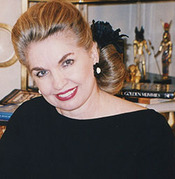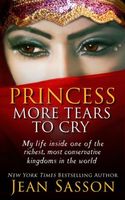

In the book JEAN SASSON: A NEW ORIENTALIST, Indian academic Vijay Mehta refers to you as the “voice of the Middle East women”. What does it mean to you to be recognized as an advocate for our sisters in the Middle East?
JEAN: I am proud to be acknowledged as a voice of the Middle East women. I feel it is one of the two greatest achievements of my life; the other being responsible for the freedom of the many confined and mistreated animals I have rescued.
I have been emotionally, and even physically, involved in assisting girls and women in need for more than 30 years. For me, one of the most depressing aspects of this entire journey has been to meet girls and women who had nowhere to turn, and to see the utter misery reflected in their sad eyes. So many told me that they felt helpless and hopeless that anyone would, or could, help them. There is no more unbearable feeling than to know a vulnerable human being is being beaten, or raped, and to struggle unsuccessfully against the culture that is keeping females in all ages in such tragic situations.
So, the fact that the books I have written, and the actions I have taken, have brought attention to the tragedies lived by so many women, and has inspired others to take up the battle and to fight for abused girls and women, is one of great pleasure. Anytime I can bring another warrior into the fold to help create change, to ensure that all females born are assured of respect and fair treatment then I feel a sense of enormous accomplishment.
As a native of Alabama, what first drew your attention and passion toward the lives of women from Saudi Arabia and surrounding areas?
JEAN: Truthfully, I did not know a lot about Saudi women’s lives until shortly before I left the United States to travel to live in the country in 1978. I had read a few books over the years and had taken note of the fact women were veiled and forbidden to join in public life, but I had to have my “feet on the ground” in the kingdom before the full force of their lives of confinement and maltreatment at the hands of the men who should have protected them struck me like a fierce hurricane.
From the moment I first visited the Souks, I carefully observed veiled women trailing men, and even without seeing their faces, their entire personas teemed with fear, fear of men. Then, at the hospital the true reality hit as I was working directly for the British and American educated Saudi head of the hospital, and was privy to all hospital reports, including patient accounts. Several early reports made my blood boil when I read about Saudi women being divorced because they gave birth to a daughter rather than a son, or, if they were struck by a serious illness and the husband simply did not want to deal with a sick or dying wife. Those women were usually abandoned and forbidden from ever again seeing their little children, bringing the greatest misery to them, and to their children. Oftentimes the families of the women would not take their innocent and daughters in need back into the family home. We had to find someone to take those women, or they would have been living on the streets homeless, something impossible in Saudi Arabia.
It soon became clear to me that the only Saudi women who lived decent lives were women married to kindly men. Otherwise, they were in for a life of intense sorrow and grief. Then after I met Princess Sultana, I was given the opportunity to do something very important, which was to make public the lives of Saudi girls and women. I was passionate about the subject then, and even more so, now.
Later, after traveling all around the Middle East, I was confronted with the reality that the cultures in the area tend to disregard the feelings, and well-being, of female members of society. While most governments in the area tend to be slightly better than Saudi Arabia, most adhere to the wishes of men.
Would you tell us about your journey to becoming an author whose stories offer a rare look at the stories of women from non-American cultures?
JEAN: My journey first began when I discovered books. My father’s family are (or were) all avid readers, keeping their noses in books or newspapers at every opportunity. I inherited their love of reading. I was about eight or nine years old when I first started reading serious books about the troubles that so often come to people and/or animals. I became totally absorbed in the true stories I read, and even some of the fictional accounts. As time passed, I progressed to books about people in other lands, and one of the first that totally caught me in the book’s grip was Pearl S. Buck’s, The Good Earth, the story of O’Lan, a young Chinese woman (who was a former slave) in an arranged marriage. Although the book was written in 1931, it felt, and still feels contemporary. Her joys and sorrows became MY joys and sorrows. I was so angry when her husband took a dancing girl as a second wife, taking away all her self-respect. When he took her two pearls for his new wife, I was so enraged that I could not sleep for days. Of course, I went on to read all of Buck’s novels, which were mainly set in China, and which brought the reader to understand the lack of respect held for most women during that time in China.
From an early age, I read four or five books a week, and by the time I was 15 or 16 years of age, I had read all the books in my small school library. A beloved teacher, Mrs. Sam Jackson, was kind enough to go to the local library to check out new books for me to read. Although I have read many genres, and I do like most books, I am most drawn to true stories about inspiring people, so it was only natural that when I took pen in hand, I was compelled to write true stories about women I came to know.
My love of reading led me to want to explore the world for myself, and so I did when I accepted a job at a royal hospital in Saudi Arabia, where I was fortunate enough to be able to travel the world, and to meet people from many countries and cultures.
From an early age, I felt I would one day write books, but as a young adult, I was so busy crisscrossing the planet (visiting 68 countries) and enjoying learning, that I postponed my writing until my frantic traveling schedule ended. Once I wrote The Rape of Kuwait, and then agreed to write Princess Sultana’s true life story, the floodgate of requests opened, and I met so many women whose compelling stories needed to be told. I’m sorry that I can only write a book every year or so, as this leaves many important stories untold.
We hear you are also a lover of animals; what are some of the reasons your compassion is drawn by them?
JEAN: My compassion is drawn to abused animals because I become that animal. You see, I was born with the gift of extreme empathy. Or, as some of my friends claim, I was born with the curse of empathy. I cannot hear about, or see a suffering animal without feeling exactly what that animal is feeling. I truly suffer if I am a witness to an animal’s despair and pain. It’s one of the few occasions in my life I simply cannot control myself. If I see a dog tied to a tree, I slam on my automobile brakes to stop, and I untie the dog, and I leave with it. I’ve had guns pulled on me. I’ve had verbal altercations, but I generally leave with the animal. If I see someone harming an animal, I stop and become involved. I’ve had a number of close calls, but I simply cannot NOT become involved.
My entire life, from the time I was a young child, has been embroiled with the saga of suffering animals. There are so many poor animals who need our help, that if I could clone myself a thousand times, I still could not save all the poor creatures who need me.
How people can be so cruel to a defenseless animal, is beyond my understanding.
You consider books to be among your greatest passions in life. What first sparked your interest in reading stories as a child?
JEAN: The love of reading is firmly implanted into my genetic code. As mentioned in an earlier response, I was born into a family of avid readers. I never saw my grandfather sitting unless he had a newspaper or a book in his hands. His mother had been a teacher and was known in the rural county (Pike Country, Alabama) as a slightly eccentric woman who let her housekeeping go just to read. When company came down the sandy lane, she was seen to leave the house in a rush, tearing off to her guests, making them believe they were extremely welcome guests to her home! My grandfather told me that the guests were always shocked with his mother ran alongside the horse and buggy, shouting out, asking if they had brought her something to read! He reported that the kids often found their mother sitting on the floor in the kitchen thoroughly enjoying reading all the words written on the canned goods or other items bought at the country store.
Oh, how I wish my great-grandmother could browse with me through my library. What joy that would be! So, I had no choice. I was born with a triple reading gene!
Fresh Fiction readers want to know: What are some of your favorite books to read?
JEAN: Admittedly, I am most drawn to non-fiction, history, biographies, etc., but I do love diving into historical fiction books. As a young woman, I could not resist any of the many Herman Wouk’s books, with The Winds of War and War and Remembrance coming to mind. I recommend those books to any reader.
And, who could skip Leon Uris’s Exodus and Mila 18?
All of William Styron’s books are a must.
As far as modern-day fiction writers, I enjoy Ken Follett books and just read The Edge of Eternity. Elaine Russell’s Across the Mekong River is a great read. And, I can’t pass up any of Fannie Flagg’s addictive reads! She is an extremely entertaining writer.
When giving books as gifts for my teenage nieces and nephews, I first read any books I purchase for them. So I found myself enthralled with The Hunger Games series, and the Stephanie Meyer Breaking Dawn and New Moon books. The Fault in our Stars was a very interesting read, as was If I Stay.
I have so many readers tell me that my Princess Sultana series (4 books thus far, including my just-released PRINCESS, MORE TEARS TO CRY) read like fiction, and are totally addictive, so perhaps that explains part of their success.
As you can see, I could go on and on, so I’ll stop here and tell you that this has been a lot of fun.
Thanks so much,
Jean Sasson
***
For more information about Jean’s books, visit her website, blog, Facebook, and Twitter. Ask the author questions here.


No Comments
Comments are closed.